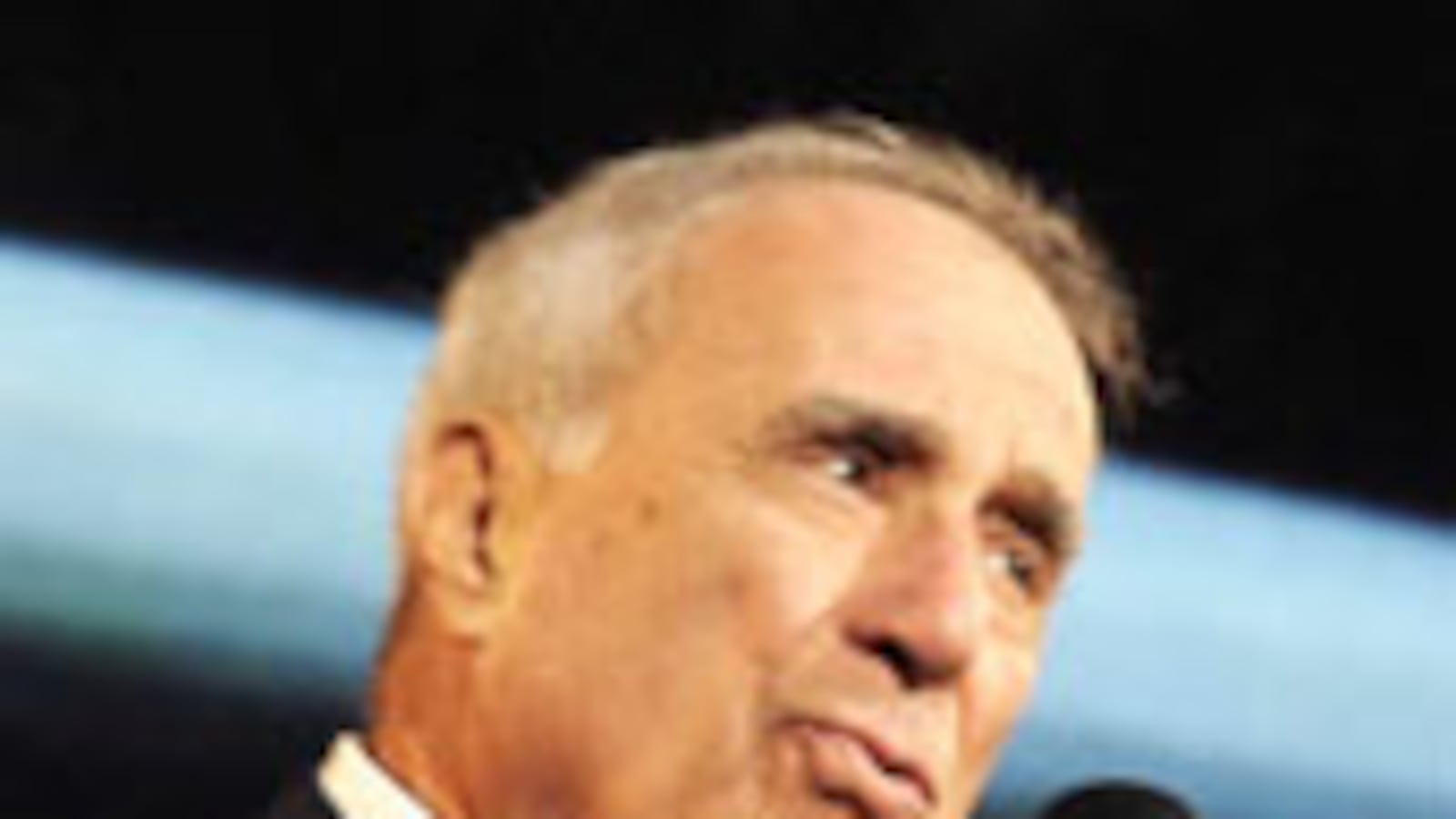
Yesterday's purchase of a 77-year-old magazine, Newsweek, by a 91-year-old audio magnate, Sidney Harman, had all the makings of a feel-good story, even as editor Jon Meacham announced his departure. A legendary media franchise rescued from an uncertain future by someone who regards Newsweek as a “national treasure” and commits himself to the highest quality. The idealistic Harman also has credibility as a brilliant innovator and businessman of stature. Though he has made his fortune in audio, he loves print. He is the author of two books and said writing “enables the process of self-discovery.” He will take over with a staff overjoyed by his commitment and his manners.
"Harman was someone who was taken less seriously by the staff who worked on the deal because he had no plan."
But make no mistake, Harman's pocket change purchase of Newsweek—he paid $1, plus the assumption of liabilities for the magazine—has to be a passion play, because it certainly isn't a financial one. The Daily Beast has obtained a copy of the 66-page sales memorandum that the Newsweek seller, the Washington Post Co., gave to prospective buyers, and it paints the picture of a media property given to someone unequipped to fundamentally change its current trajectory.
Much will depend on finding a near-genius editor and an inspired publisher and on their freedom and shared approach, as well as on their bankroll. As with many weeklies, Newsweek’s financial freefall is jarring. Revenue dropped 38 percent between 2007 and 2009, to $165 million. Newsweek's negligible operating loss (not including certain pension and early retirement changes) of $3 million in 2007 turned into a bloodbath: the business lost $32 million in 2008 and $39.5 million in 2009. Even after reducing headcount by 33 percent and slashing the number of issues printed and distributed to readers each week from 2.6 million to 1.5 million, the 2010 operating loss is still forecast at $20 million.
Dig deeper into the document and the numbers get worse. Newsweek lost money in all three of its core areas in 2008 and 2009: U.S. publishing, foreign publishing, and digital. Even with the smaller guaranteed circulation, it still retains $40 million in subscription liabilities owed to readers. And then there's Newsweek's lease foibles: last year, it paid $13 million in rent, a startling figure for a company its size.
Click Image to See 10 Memorable Newsweek Covers

Into this picture steps Sidney Harman, who is venerable enough to have read the very first issue of Newsweek back in 1933. By Harman's own admission, at a gathering of the magazine's staffers yesterday, his goal isn't to make a profit any time soon, but rather to reach break-even by 2013. Clearly, while the billionaire founder of Harman/Kardon and Harman International Industries is new to the media world, he's already got the "flat is the new up" mantra down pat.
• Newsweek Staffers Nervous After Sale• Who Killed Newsweek?• Palin’s Brilliant Facebook Strategy• Rebecca Dana & Peter Lauria: Newsweek’s Hidden Problem• The Secret Newsweek FilesBut by the Washington Post Co.'s own account, as told via the sales memorandum, Harman's Newsweek lacks what is necessary for a turnaround: the synergies of another media company. "The right strategic partner can potentially provide scale and synergies on the digital platform," the memo states. Additionally, if another media company bought Newsweek—such as when Bloomberg rescued BusinessWeek in a fire sale last year—then the murderously inefficient $55 million in general and administrative costs that Newsweek carried in 2009 (covering everything from finance, accounting, and rent to legal, HR, and IT) could be greatly reduced by sharing resources. Standalone magazines no longer work.
Yet Harman has none of that: neither the scale to juice sales nor the media infrastructure to reduce costs. When the microphone had to be lowered yesterday to accommodate Harman's diminutive stature during his address to the troops, he joked, "This microphone will be the last thing I will cut down to size," in an attempt to reassure staffers that he wasn't about to order wholesale layoffs.
In fact, Washington Post CEO Donald Graham apparently considered the fact that Harman would need to retain Newsweek's back-office inefficiencies a selling point, even as his company's sales memo advised otherwise. Graham will not have all that blood on his hands. (When one of the great brands in American journalism sells for a buck, legacy is about the only tangible currency left to haggle over.)
"Harman was someone who was taken less seriously by the staff who worked on the deal because he had no plan," says a person close to the deal. "He won the bid because he had the lowest number of layoffs."
Thus, further cuts have been kicked down the road, to occur on Harman's watch—or that of his heirs, who may include his wife, California Democratic Congresswoman Jane Harman.
"[Harman] has enough money for this to be a hobby that he can have fun with while trying to fix," says prominent media banker Reed Phillips.
Adds longtime friend and Newsweek political correspondent Howard Fineman, who wooed Harman to purchase the magazine over a mid-May lunch at the Hay Adams Hotel in Washington, D.C., "I told him that it's a great nameplate, and it's worth saving for several reasons, one of which is its global reach. It really does circulate around the world."
One Newsweek employee who attended the session in a 10th floor auditorium at 395 Hudson Street said Harman's talk was, by turns, "charming, erudite, funny, and intelligent."
Invoking Einstein and Maxwell Anderson—whom he quoted at length about how the things that last are those that make sense of the world, and all the rest is ephemeral and transitory—Harman said he saw Newsweek's role as connecting the dots to help readers understand a complex planet.
"We've been beaten down so much, and we've taken so many shots that for somebody to come in who has an infectious enthusiasm for what we do was really surprising," says Newsweek senior columnist Jonathan Alter. "I think we were charmed and a little bit stunned."
In fairness to Harman, many moguls, from Si Newhouse (The New Yorker) to David Bradley (The Atlantic) have had the patience to take their money-losing gems all the way into the black. But the print media outlook has never been worse—and even billionaires tire of losing money. For every Newhouse and Bradley, there are currently two Sam Zells, who had employees of the Tribune Company rejoicing about their good fortune in finding a benefactor willing to sustain millions of dollars in losses to protect journalism's standing as a public trust.
Zell has low esteem in the journalistic community. He is altogether a different character from Harman, but Zell, too, promised minimal layoffs and a commitment to finding a business model that worked; Zell’s tune quickly changed after realizing the realities of today’s printed media world, however, and multiple rounds of layoffs and an eventual bankruptcy proceeding are the legacy his Tribune purchase left behind.
Those are the kind of realities that prompted Fred Drasner, the former CEO of Daily News and US News and World Report, who also bid on Newsweek, to sum up Harman's $1 acquisition this way: "I think he paid a very full price."
Peter Lauria is senior correspondent covering business, media, and entertainment for The Daily Beast. He previously covered music, movies, television, cable, radio, and corporate media as a business reporter for the New York Post. His work has also appeared in Avenue, Blender, Black Men, and Media Magazine, and he's appeared on CNBC, Bloomberg, BBC Radio, and Reuters TV.
Lloyd Grove is editor at large for The Daily Beast. He is also a frequent contributor to New York magazine and was a contributing editor for Condé Nast Portfolio. He wrote a gossip column for the New York Daily News from 2003 to 2006. Prior to that, he wrote the Reliable Source column for the Washington Post, where he spent 23 years covering politics, the media, and other subjects.







